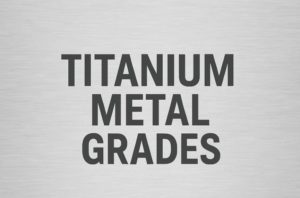Titanium Grades Explained: Which One is Right for Your Application?
Titanium has become a go-to material across many heavy industrial sectors, including chemical processing, oil & gas, marine, and mining — and for good reason. Its superior corrosion resistance, excellent strength-to-weight ratio, and high-temperature durability make it a top performer in challenging environments.
But not all titanium is created equal.
Choosing the right grade of titanium for your application can impact everything from lifespan and safety to compliance and cost. Below, we’ll break down the most common titanium grades, their key properties, and which industries benefit most from each.
Why Titanium? A Material Built for Harsh Environments
Titanium’s appeal in industrial applications comes down to a few standout characteristics:
- Exceptional corrosion resistance, especially in saltwater, acids, and chlorides
- High strength with low weight, ideal for reducing structural load
- Excellent temperature resistance, suitable for high-heat environments
- Weldability and formability, depending on grade
- Long-term cost savings due to reduced downtime and equipment failure
According to the International Titanium Association, over 95% of industrial titanium use falls into Grades 1, 2, 7, and 12 due to their chemical and corrosion-resistant profiles.
Common Titanium Grades and Their Properties
Here are the most widely used titanium grades in commercial and industrial settings:
| Grade | Type | Key Properties | Common Applications |
| Grade 1 | Commercially Pure | Softest, highest ductility, excellent corrosion resistance, easy to form and weld | Heat exchangers, marine parts, architectural |
| Grade 2 | Commercially Pure | Most widely used grade, balanced strength and corrosion resistance, great weldability | Pressure vessels, pipelines, pulp & paper plants |
| Grade 5 | Ti-6Al-4V (alloyed) | High strength, heat resistance, less corrosion resistant than CP grades | Aerospace, subsea, high-stress components |
| Grade 7 | CP titanium + palladium | Like Grade 2, but with improved resistance to crevice and reducing acid corrosion | Chlorine production, chemical processing plants |
| Grade 12 | Ti-0.3Mo-0.8Ni (alloyed) | Excellent weldability, moderate strength, great resistance to hot acids and brines | Heat exchangers, marine vessels, refineries |
Source: ASTM B265 Specification for Titanium and Titanium Alloy Strip, Sheet, and Plate.
Titanium Grades by Industry: Quick Reference Table
We’ve mapped out which grades are most suited to PM International’s core industries:
| Industry | Recommended Grades | Why It Works |
| Marine/Shipbuilding | Grade 2, Grade 12 | Outstanding saltwater corrosion resistance; weldable and reliable under variable conditions |
| Chemical Processing | Grade 7, Grade 12 | Handles chlorides, nitric and sulfuric acids; meets NORSOK and ASTM specs |
| Oil & Gas | Grade 5, Grade 12 | Withstands pressure, temperature, and hydrogen sulfide exposure |
| Mining | Grade 2, Grade 12 | Long service life in slurry systems and corrosive media |
| Power Generation | Grade 2, Grade 7 | Reliable in heat exchangers, condensers, and steam-side systems |
| Pulp & Paper | Grade 2, Grade 12 | Resistant to bleach chemicals and chlorides in processing systems |
Key Factors When Selecting a Grade
When choosing the right titanium grade, consider the following:
- Corrosive media (e.g., acids, chlorides, seawater)
- Operating temperature
- Required strength and pressure ratings
- Weldability or machinability
- Applicable codes: ASTM, NORSOK, ASME
- Availability and delivery timelines
If your project involves heat exchangers or pressurized vessels in highly corrosive environments, Grade 12 might provide better ROI than more common CP grades.
Real-World Example: Avoiding Downtime in a Chemical Plant
One of PM International’s Gulf Coast customers — a chemical processing plant — faced frequent failures using lower-grade alloys in their heat exchanger systems. After switching to Grade 12 titanium fittings, sourced directly from PM International’s in-stock inventory, they eliminated unplanned shutdowns and avoided over $500,000 in lost productivity over two years.
Why PM International?
At PM International (pmfirst.com), we specialize in stocking and sourcing titanium grades 2 and 12 — both widely used in critical operations. Our clients trust us for:
✅ Fast lead times and global shipping
✅ In-house expertise on spec and compliance
✅ Valve, flange, tubing, and fitting availability
✅ Technical guidance for sourcing and applications
Talk to a Titanium Specialist Today
If you’re not sure which titanium grade is best for your next industrial or marine project, PM International is here to help. We can walk you through the specifications, compliance requirements, and even offer custom quotes.
👉 Request a Quote or call us directly to get started.




